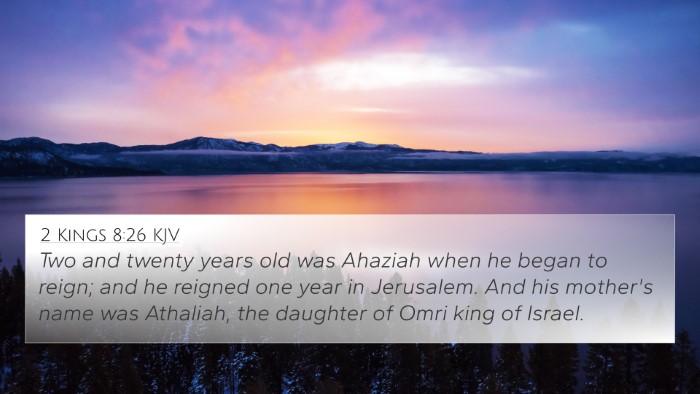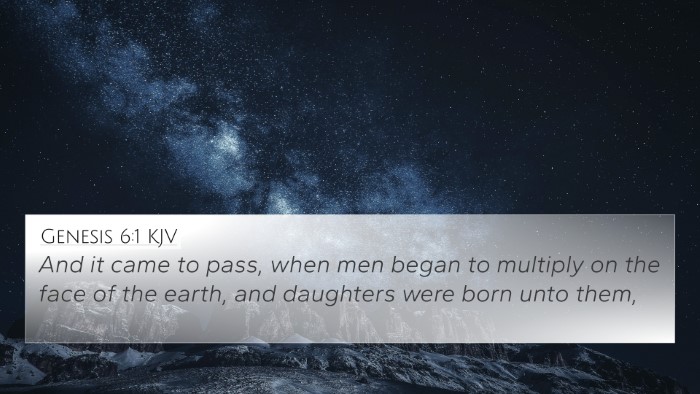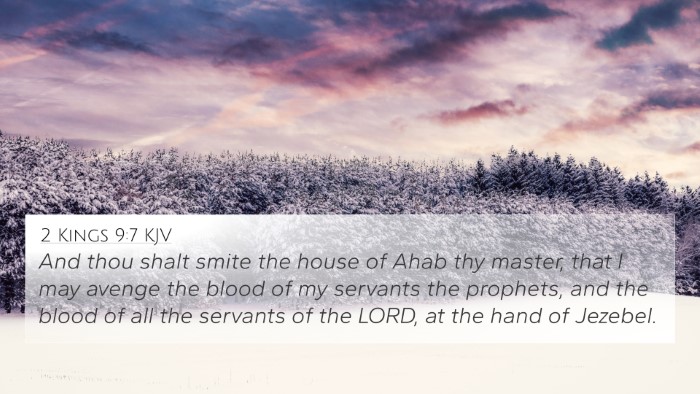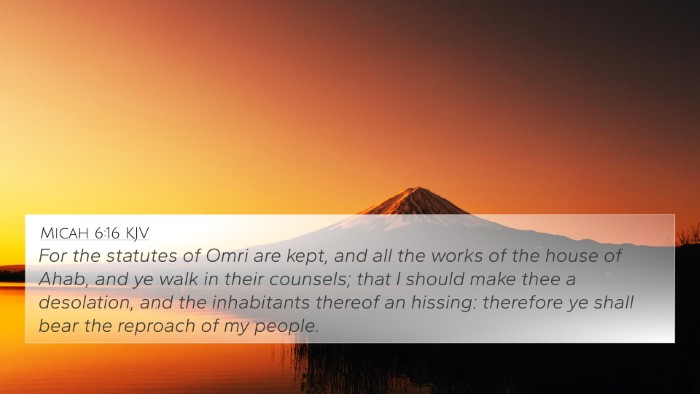Understanding 2 Kings 8:18
Verse: 2 Kings 8:18 - "And he walked in the way of the kings of Israel, as did the house of Ahab: for the daughter of Ahab was his wife: and he did evil in the sight of the LORD."
Summary of the Verse's Meaning
This verse provides a significant insight into the actions and character of King Jehoram, the son of Jehoshaphat, king of Judah. By noting that he "walked in the way of the kings of Israel," it emphasizes his alignment with the sinful practices of Israel's monarchy, particularly those initiated by Ahab. This alignment, compounded by his marriage to Ahab’s daughter, signifies a crucial political and spiritual compromise that leads to his condemnation before God.
Commentary Insights
Matthew Henry's Commentary
Henry underscores that Jehoram's choices were reflective of his upbringing under a good father, Jehoshaphat, yet he strayed due to the influence of his wife. His marriage into Ahab's family brought idolatry and evil practices into Judah, illustrating how personal relationships can impact one’s spiritual decisions. Henry warns that the evil done in the sight of the Lord brings judgment, and emphasizes that Jehoram's actions not only reflect a poor personal choice but have ramifications for the kingdom of Judah.
Albert Barnes' Commentary
Barnes notes the contextual historical significance of Jehoram’s reign, emphasizing the political alliances that were formed through marriages. He argues that Jehoram’s evil deeds stem from his lack of commitment to the covenant with God, thus stating that the influence of Ahab's house led him astray. He highlights the importance of remaining faithful to God amidst negative influences, noting that compromises often lead to greater evils, not just personal failures but community-wide consequences as well.
Adam Clarke's Commentary
Clarke elaborates on the destructive nature of Jehoram's marriage with Ahab’s daughter, reflecting on how familial ties can significantly influence one's moral and spiritual decisions. He also points out the historical context regarding the idolatry and the spiritual decline in Judah during this period. Clarke emphasizes the thematic reminder of the dangers of aligning oneself with those who oppose God’s ways.
Bible Verse Cross-References
To deepen understanding of 2 Kings 8:18, consider the following cross-references that illustrate similar themes of influence, sin, and the consequences of choices:
- 1 Kings 22:52-53 - Discusses the evil ways of Ahaziah, the king of Israel.
- 2 Chronicles 21:6 - References Jehoram’s alignment with the ways of Israel and rejection of God.
- 2 Kings 3:2 - Shows how the kings of Israel committed evil in the sight of the Lord.
- Joshua 23:12-13 - Warns against intermarriage with non-believers leading to idolatry.
- Exodus 34:12-16 - Explicit command against making covenants with the people of the land, to prevent idolatry.
- 2 Chronicles 22:3 - Further insight into Jehoram's practices and how they parallel those of Ahab.
- 1 Kings 16:30 - Highlights Ahab's wickedness, setting a backdrop for understanding Jehoram's actions.
Thematic Connections
This verse profoundly interacts with themes found within both the Old and New Testament. Such inter-Biblical dialogue can be enriched by understanding how rulers and individuals are held accountable for their relationships and decisions:
- Influence of Relationships: Romans 16:17-18 discusses avoiding divisive influences.
- Consequences of Leadership: James 3:1 emphasizes the weight of judgment on leaders.
- Idolatry and Sin: 1 Corinthians 10:21 cautions against participating in idolatry.
Tools for Bible Cross-Referencing
To enhance your study of connections between Bible verses like 2 Kings 8:18, consider utilizing various tools such as:
- Bible Concordance: Helps to locate verses by specific words and themes.
- Bible Reference Resources: Contains compilations of cross-references for in-depth study.
- Cross-reference Bible Study Guides: Designed for structured exploration of biblical texts and their interconnections.
- Comprehensive Bible Cross-Reference Materials: For serious study, these materials provide extensive listings of related verses.
Conclusion
The examination of 2 Kings 8:18 reveals the negative influence of societal and familial relationships on personal faith and leadership in Israel. Through cross-referencing and thematic connections to other Scriptures, the imperative to remain faithful to God's covenant amidst corrupt influences becomes increasingly clear. This verse serves as a cautionary tale not only for leaders but for every believer, underscoring the necessity of making wise choices that align with divine principles.



















